Divine Disclosures of Master Duc Quy’s past life by Lĩnhnam on Sat Jun 13, 2009 2:47 pm; translated by Dianichi, edited and posted by rain9811.
Here are accounts of the revelations experienced in the life of our Master, Duc Quy.In approximately 1980, Master Duc Quy, then a young man, worked as an English teacher at a high school in Tra Vinh province, Vietnam. When he received his immigration papers from the Ministry of Home Affairs, he resigned from his teaching position in anticipation of moving to the United States. However, it would be two years before he could actually depart, as there were no available flights to the US at that time. With ample free time on his hands, he immersed himself in studying both the exoteric and esoteric teachings of Buddhism.
Coincidentally, some of his colleagues had mentioned Son Ngoc Dieu, an administrative clerk at their school renowned for her dedication as a disciple of Venerable Minh Tri. Venerable Minh Tri was a highly respected monk renowned for his expertise in exorcism during his lifetime. He had founded numerous Buddhist temples under the Association for Laymen of the Buddha’s Pure Land across various provinces in the South, including Bien Hoa, as well as in the Eastern and Western provinces.
This sect emphasized prayer to Amitabha Buddha for blessings and wisdom. Their temples provided herbal medicine and employed acupuncture for healing purposes. Son Ngoc Dieu, nearly 60 years old, unmarried, and adhering to a vegetarian diet for two decades, was on the verge of becoming the abbess of one of the temples in the province of Tra Vinh. She was reputed for her ability to reveal a person’s past lives. Upon learning about her, the teachers informed Scholar Duc Qui, and together they visited her to request a reading of their past lives.
At her residence, altars lined with numerous shelves greeted the group of teachers and Scholar Duc Qui. Son Ngoc Dieu, after lighting incense at the altars, seated herself at the main one to pray. After a while, she appeared surprised and informed Scholar Duc Qui about a vision she had through her third eye. In this vision, the Jade Emperor God descended alongside her master, Venerable Minh Tri. She recounted that the Jade Emperor God inquired whether Scholar Duc Qui had read the Vimalakirti Sutra. Having read hundreds of Buddhist sutras, Scholar Duc Qui confirmed this. The Jade Emperor then proclaimed, “You will also be like Vimalakirti.”
Master Duc Quy then elaborated on Vimalakirti:
Licchavi Vimalakirti, as depicted in the sutra, was a renowned, affluent, and profoundly enlightened layman. He possessed unparalleled eloquence in expounding the principles of the Dharma and exhibited supernatural abilities. Despite the reverence held by the ten leading disciples of the Buddha at the time, including Ananda, Sariputra, Mahamaudgalyayana, Mahakasyapa, and Subhuti, they hesitated to visit Vimalakirti. This reluctance stemmed from his habit of correcting, criticizing, and teaching them. Even the Bodhisattvas were wary of engaging in religious debates with him.
In reality, Licchavi Vimalakirti was believed to be the manifestation of a great Bodhisattva residing in the realm of Immobility. He chose to appear in the human world as a layman to assist Sakyamuni Buddha in spreading the Dharma. Despite his lofty spiritual stature, Vimalakirti frequently visited places like cabarets, brothels, and gambling houses to impart wisdom to the people who frequented these establishments.
According to the sutra, Bodhisattva Jagaimdhara recounted an incident where the wicked Mara, disguised as Indra and accompanied by twelve thousand heavenly maidens, approached him with music and singing. Mara, surrounded by the heavenly maidens, urged Jagaimdhara to accept them as servants. However, Jagaimdhara refused, deeming it inappropriate for a spiritual practitioner. At that moment, Licchavi Vimalakirti intervened, discerning Mara’s deception. Vimalakirti demanded that Mara hand over the heavenly maidens to him. Despite Mara’s attempts to escape, he was unable to do so, and a voice from the sky commanded Mara to surrender the maidens to Vimalakirti before returning to his realm. Reluctantly, Mara complied.
The maidens, now under Vimalakirti’s care, joyfully received teachings from him to aid their journey towards enlightenment. When Mara tried to reclaim them, they refused to go with him. Mara then asked Vimalakirti to return the maidens, and he complied, imparting to them guidance on a Dharma practice known as “The Inexhaustible Lamp.” Vimalakirti instructed the maidens to use this practice to inspire gods and goddesses upon their return to Mara’s realm. Gratefully, the maidens bowed to Licchavi Vimalakirti before departing with Mara.
As Lady Son Ngoc Dieu shared the prophecy with Scholar Duc Qui, likening him to the revered Vimalakirti, he listened but remained skeptical. At that time, he was still young, just beginning his exploration of the Dharma. He had not yet acquired any supernatural abilities, nor had he validated the teachings of the Dharma. Moreover, he had not yet embarked on preaching the Dharma, and financial resources were scarce during that period.
Upon arriving in the United States, Scholar Duc Qui brought with him only two Buddhist sutras and limited financial means. Over the course of 30 years of spreading the Dharma, he conducted initiation rites for individuals from all walks of life: from laborers to patrons of brothels, cabarets, and casinos, as well as intellectuals, soldiers, and generals. This diverse cross-section of society, as recounted in Scholar Duc Qui’s book “The Quintessence of Esoteric Buddhism,” received his teachings.
Blessed with material abundance resulting from his efforts, Scholar Duc Qui lived a worry-free life akin to that of the affluent. He often conducted teachings in modest eateries along narrow streets and even within establishments known for indulgence, with the aim of enlightening and uplifting those who frequented such places.
Reflecting on the prophecy made by Lady Son Ngoc Dieu about his future, Scholar Duc Qui recognizes its fulfillment in his life. He has shared this insight with a select few disciples, seeking to deepen their understanding and experiences in the Dharma.
Scholar Duc Qui has explained to me why he references God, Holy Spirits, and Buddhas of the Ten Directions, despite being a Buddhist. Initially, his religious studies focused solely on Buddhism, leading him to dismiss the concept of God and recognize only the existence of Buddha. After studying hundreds of Buddhist sutras, none of which mentioned or endorsed the worship of God, he remained skeptical about God’s existence.
However, Scholar Duc Qui’s perspective underwent a significant transformation through encounters with practitioners of esoteric traditions. These individuals demonstrated exceptional virtue and mastery of the Dharma, and Scholar Duc Qui experienced Divine Revelations through them. Consequently, he now affirms the existence of God the Creator, deities, and Buddhas in the Ten Directions as tangible realities within the Invisible World.
Long before his encounter with Lady Son Ngoc Dieu, Scholar Duc Qui had met the Venerable Abbot, who presided over all Cambodian Buddhist Temples in Tra Vinh. At that time, Scholar Duc Qui had yet to begin his exploration of the Dharma or read any sutras. Upon seeing Scholar Duc Qui for the first time, the Venerable Monk pointed a finger at him and proclaimed, “Behold! This is the son of God! I saw people leading the way ahead and the retinue in the back in your escort,” exclaimed the Venerable Monk. He further added, “When you leave this home behind, you will have another one in the United States…”
These are just two of the numerous revelations experienced by Scholar Duc Qui, with others remaining undisclosed for now.
Scholar Duc Qui shares the above stories with the intention of aiding disciples on the Secret Teachings Path in understanding an important principle: when receiving divine revelations, prophecies, or recognition about oneself, even from various practitioners of esoteric Dharma, it’s crucial not to immediately accept them as truth. Instead, one must wait until they manifest to verify their accuracy, even if this process may take decades. Only when divine revelations materialize can they be considered genuine. Through his religious and mystical experiences, Scholar Duc Qui has realized that everything in his life occurs for a reason and is almost predetermined.
It’s important not to misinterpret Scholar Duc Qui’s intentions when he shares his experiences of divine revelations. At over 60 years old, he has traversed both the material and spiritual paths, attaining blessings and recognition in Heaven. Consequently, there is no need for him to desire anything else in this life. As he expressed to me, “It does not matter whether the revelations are true, as all things will pass quickly compared to the infinity of this immense universe. Everything, whether spiritual or physical, that belongs to this earth, is but an illusion and a dream.”
To my fellow religious brothers and sisters who have already been initiated:
If, in the future, you encounter individuals from the lower echelons of society involved in prostitution and gambling who mention Scholar Duc Qui or refer to him as Teacher, do not be surprised. They too have received from him the Dharma of the Inexhaustible Lamp and have become disciples in the Secret Teachings system of the Old Guru.
Sincerely,
LN
Below are a few links for anyone interested in learning more about the life of Vimalakirti.
Updated 4/13/24
A few links for anyone interested in learning more about the life of Vimalakirti.
http://www2.kenyon.edu/Depts/Religion/Fac/Adler/Reln260/Vimalakirti.htm
At that time, there lived in the great city of Vaisali a certain Licchavi, Vimalakirti by name. Having served the ancient Buddhas, he had generated the roots of virtue by honoring them and making offerings to them. He had attained tolerance as well as eloquence. He played with the great super knowledges. He had attained the power of incantations and the fearlessnesses. He had conquered all demons and opponents. He had penetrated the profound way of the Dharma. He was liberated through the transcendence of wisdom. Having integrated his realization with skill in liberative technique, he was expert in knowing the thoughts and actions of living beings. Knowing the strength or weakness of their faculties, and being gifted with unrivaled eloquence, he taught the Dharma appropriately to each. Having applied himself energetically to the Mahayana, he understood it and accomplished his tasks with great finesse. He lived with the deportment of a Buddha, and his superior intelligence was as wide as an ocean. He was praised, honored, and commended by all the Buddhas and was respected by Indra, Brahma, and all the Lokapalas.
In order to develop living beings with his skill in liberative technique, he lived in the great city of Vaisali. His wealth was inexhaustible for the purpose of sustaining the poor and the helpless. He observed a pure morality in order to protect the immoral. He maintained tolerance and self-control in order to reconcile beings who were angry, cruel, violent, and brutal. He blazed with energy in order to inspire people who were lazy. He maintained concentration, mindfulness, and meditation in order to sustain the mentally troubled. He attained decisive wisdom in order to sustain the foolish.
He wore the white clothes of the layman, yet lived impeccably like a religious devotee. He lived at home, but remained aloof from the realm of desire, the realm of pure matter, and the immaterial realm. He had a son, a wife, and female attendants, yet always maintained continence. He appeared to be surrounded by servants, yet lived in solitude. He appeared to be adorned with ornaments, yet always was endowed with the auspicious signs and marks. He seemed to eat and drink, yet always took nourishment from the taste of meditation. He made his appearance at the fields of sports and in the casinos, but his aim was always to mature those people who were attached to games and gambling. He visited the fashionable heterodox teachers, yet always kept unswerving loyalty to the Buddha. He understood the mundane and transcendental sciences and esoteric practices, yet always took pleasure in the delights of the Dharma. He mixed in all crowds, yet was respected as foremost of all.
In order to be in harmony with people, he associated with elders, with those of middle age, and with the young, yet always spoke in harmony with the Dharma. He engaged in all sorts of businesses, yet had no interest in profit or possessions. To train living beings, he would appear at crossroads and on street corners, and to protect them he participated in government. To turn people away from the Hinayana and to engage them in the Mahayana, he appeared among listeners and teachers of the Dharma. To develop children, he visited all the schools. To demonstrate the evils of desire, he even entered the brothels. To establish drunkards in correct mindfulness, he entered all the cabarets
He was honored as the businessman among businessmen because he demonstrated the priority of the Dharma. He was honored as the landlord among landlords because he renounced the aggressiveness of ownership. He was honored as the warrior among warriors because he cultivated endurance, determination, and fortitude. He was honored as the aristocrat among aristocrats because he suppressed pride, vanity, and arrogance. He was honored as the official among officials because he regulated the functions of government according to the Dharma. He was honored as the prince of princes because he reversed their attachment to royal pleasures and sovereign power. He was honored as a eunuch in the royal harem because he taught the young ladies according to the Dharma.
He was compatible with ordinary people because he appreciated the excellence of ordinary merits. He was honored as the Indra among Indras because he showed them the temporality of their lordship. He was honored as the Brahma among Brahmas because he showed them the special excellence of gnosis. He was honored as the Lokapala among Lokapalas because he fostered the development of all living beings.
Thus lived the Licchavi Vimalakirti in the great city of Vaisali, endowed with an infinite knowledge of skill in liberative techniques.
http://www2.kenyon.edu/Depts/Religion/Fac/Adler/Reln260/Vimalakirti.htm
Jagatimdhara replied, “My Lord, I am indeed reluctant to go to that good man to inquire about his illness. Why? Lord, I remember that one day, when I was at home, the wicked Mara, disguised as Indra and surrounded with twelve thousand heavenly maidens approached me with the sounds of music and singing. Having saluted me by touching my feet with his head, he withdrew with his retinue to one side. I then, thinking he was Sakra, the king of the gods, said to him, ‘Welcome, O Kausika! You should remain consciously aware in the midst of the pleasures of desire. You should often think on impermanence and strive to utilize the essential in body, life, and wealth.’
“Mara then said to me, ‘Good sir, accept from me these twelve thousand divine maidens and make them your servants.’
“I replied, ‘O Kausika, do not offer me, who am religious and a son of the Sakya, things which are not appropriate. It is not proper for me to have these maidens.’
“No sooner had I said these words than the Licchavi Vimalakirti came there and said to me, ‘Noble son, do not think that this is Indra! This is not Indra but the evil Mara, who has come to ridicule you.’
“Then the Licchavi Vimalakirti said to Mara, ‘Evil Mara, since these heavenly maidens are not suitable for this religious devotee, a son of the Sakya, give them to me.’
“Then Mara was terrified and distressed, thinking that the Licchavi Vimalakirti had come to expose him. He tried to make himself invisible, but, try as he might with all his magical powers, he could not vanish from sight. Then a voice resounded in the sky, saying, ‘Evil One, give these heavenly maidens to the good man Vimalakirti, and only then will you be able to return to your own abode.’
“Then Mara was even more frightened and, much against his will, gave the heavenly maidens.
“The Licchavi Vimalakirti, having received the goddesses, said to them, ‘Now that you have been given to me by Mara, you should all conceive the spirit of unexcelled, perfect enlightenment.’
“He then exhorted them with discourse suitable for their development toward enlightenment, and soon they conceived the spirit of enlightenment. He then said to them, ‘You have just conceived the spirit of enlightenment. From now on, you should devote yourselves to find joy in pleasures of the Dharma, and should take no pleasure in desires.’
“They then asked him, ‘What is “joy in the pleasures of the Dharma”?’
“He declared, ‘It is the joy of unbreakable faith in the Buddha, of wishing to hear the Dharma, of serving the Sangha and honoring the spiritual benefactors without pride. It is the joy of renunciation of the whole world, of not being fixed in objects, of considering the five aggregates to be like murderers, of considering the elements to be like venomous serpents, and of considering the sense-media to be like an empty town. It is the joy of always guarding the spirit of enlightenment, of helping living beings, of sharing through generosity, of not slackening in morality, of control and tolerance in patience, of thorough cultivation of virtue by effort, of total absorption in meditation, and of absence of passions in wisdom. It is the joy of extending enlightenment, of conquering the Maras, of destroying the passions, and of purifying the buddha-field. It is the joy of accumulating all virtues, in order to cultivate the auspicious marks and signs. It is the joy of the liberation of nonintimidation when hearing the profound teaching. It is the joy of exploration of the three doors of liberation, and of the realization of liberation. It is the joy of being an ornament of the seat of enlightenment, and of not attaining liberation at the wrong time. It is the joy of serving those of equal fortune, of not hating or resenting those of superior fortune, of serving the spiritual benefactors, and of avoiding sinful friends. It is the joy of the superior gladness of faith and devotion to the Dharma. It is the joy of acquiring liberative techniques and of the conscious cultivation of the aids to enlightenment. Thus, the bodhisattva admires and finds joy in the delights of the Dharma.’ “Thereupon, Mara said to the goddesses, ‘Now come along and let us return home.’
“They said, ‘You gave us to this householder. Now we should enjoy the delights of the Dharma and should no longer enjoy the pleasures of desires.’
“Then Mara said to the Licchavi Vimalakirti, ‘If it is so that the bodhisattva, the spiritual hero, has no mental attachment, and gives away all his possessions, then, householder, please give me these goddesses.’
“Vimalakirti replied, ‘They are given, Mara. Go home with your retinue. May you fulfill the religious aspirations of all living beings!’
“Then the goddesses, saluting Vimalakirti, said to him, ‘Householder, how should we live in the abode of the Maras?’
“Vimalakirti replied, ‘Sisters, there is a door of the Dharma called “The Inexhaustible Lamp.” Practice it! What is it? Sisters, a single lamp may light hundreds of thousands of lamps without itself being diminished.
Likewise, sisters, a single bodhisattva may establish many hundreds of thousands of living beings in enlightenment without his mindfulness being diminished. In fact, not only does it not diminish, it grows stronger. Likewise, the more you teach and demonstrate virtuous qualities to others, the more you grow with respect to these virtuous qualities. This is the door of the Dharma called “The Inexhaustible Lamp.” When you are living in the realm of Mara, inspire innumerable gods and goddesses with the spirit of enlightenment. In such a way, you will repay the kindness of the Tathagata, and you will become the benefactors of all living beings.’
Related Post
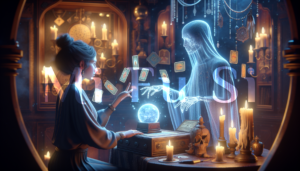
Principle of fortune telling
Principle of fortune telling (CHUYỆN BÓI TOÁN by hoctro-gia on Mon Dec 29, 2008 7:27 am, edited by xiaobaiyun) Fortune-telling...

Maitreya
Maitreya The following text comes from the Cambodian Buddhist web site http://reksmay.webs.com/messagefrombuddhas.htm. I would like to hear your opinion of...

A Good bye from Old Guru
A Good bye from Old Guru Thầy Già nói lời kết; by ThầyGià on Wed Nov 12, 2008 Translated by...
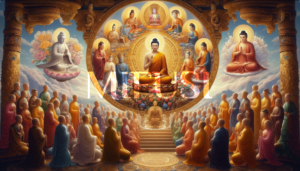
Atheists Trumps Fanatics
Atheists Trumps Fanatics Thà là người vô thần... by Dianichi on Wed Nov 19, 2008 3:04 pm Sure, here's a...
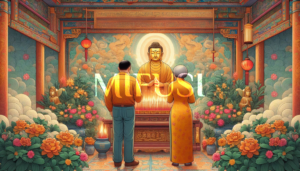
My mom’s mystical experiences
My mom's mystical experiences CHUYỆN HUYỀN BÍ CỦA MẸ CON by Namlinhchi - translated by Bluesky - edited by Horangi....
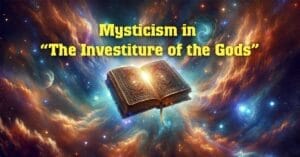
JIANG ZIYA’S MARRIAGE
After showing respect to his master and bidding farewell to his friends, Jiang Ziya departed from the mountain and journeyed...
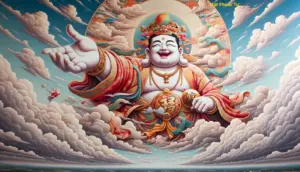
Good luck Yantra
Good luck Yantra All of these yantras have magic powers and can only be used by those who have been...
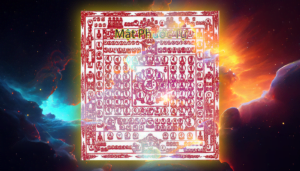
CHAPTER 2 I: II – ADHISTANA (PART 2/6)
II. ADHISTANA: Adhistana is translated in ancient Chinese as a spiritual force, a supernatural force, or the 'giving-upholding' force. It...
